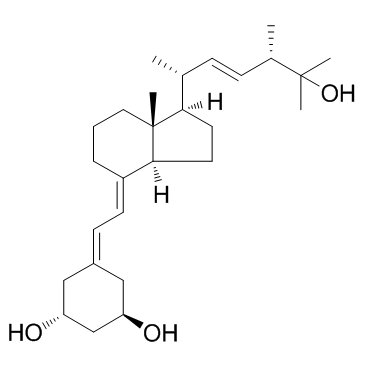Effect of vitamin D analogues on acute cardiorenal syndrome: a laboratory rat model.
Ofer Havakuk, Michal Entin-Meer, Jeremy Ben-Shoshan, Pavel Goryainov, Sofia Maysel-Auslender, Erel Joffe, Gad Keren
Index: Isr. Med. Assoc. J. 15(11) , 693-7, (2013)
Full Text: HTML
Abstract
Vitamin D has been shown to induce beneficial effects on cardiovascular and renal morbidity by regulating inflammation and tissue fibrosis.To evaluate the effect of vitamin D analogues on cardiac function and fibrosis in an animal model of cardiorenal syndrome.Unilateral nephrectomy was performed and myocardial infarction induced in rats. The rats were treated with vitamin D receptor activator (VDRA, paricalcitol, 40 ng/250 g x 3/week) versus a vehicle. A third group of animals, which served as the control, underwent sham surgery and received no treatment. After 4 weeks of treatment, cardiac function and fibrosis were assessed by trans-thoracic echo and histology, respectively. As a parameter of systemic inflammation, previously shown to be altered in acute coronary syndrome, T regulatory (Treg) cell levels were measured by flow cytometry. Renal dysfunction was documented by standard laboratory tests.After 4 weeks of treatment, no significant improvement in cardiac function parameters was noted following VDRA administration. VDRA treatment did not significantly alter Treg cell systemic levels. Consistently, despite a trend toward less extent of myocardial fibrosis, we found no clear beneficial effects of VDRA on myocardial tissue inflammation and remodeling.Vitamin D treatment showed no beneficial effects on cardiac function parameters and fibrosis in an animal model of cardiorenal syndrome.
Related Compounds
| Structure | Name/CAS No. | Molecular Formula | Articles |
|---|---|---|---|
 |
Paricalcitol
CAS:131918-61-1 |
C27H44O3 |
|
Paricalcitol, a vitamin d receptor activator, inhibits tumor...
2014-09-01 [Reprod. Sci. 21(9) , 1108-19, (2014)] |
|
Mesenchymal stem cells and a vitamin D receptor agonist addi...
2014-12-15 [Am. J. Physiol. Renal Physiol. 307(12) , F1412-26, (2014)] |
|
Spotlight on paricalcitol in secondary hyperparathyroidism.
2005-01-01 [Treat. Endocrinol. 4(3) , 185-6, (2005)] |
|
Paricalcitol counteracts the increased contrast induced neph...
2014-10-01 [Eur. Rev. Med. Pharmacol. Sci. 18(19) , 2895-902, (2014)] |
|
Vitamin D increases plasma renin activity independently of p...
2013-10-15 [Am. J. Physiol. Renal Physiol. 305(8) , F1109-17, (2013)] |